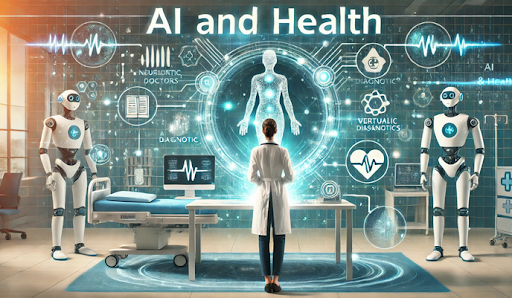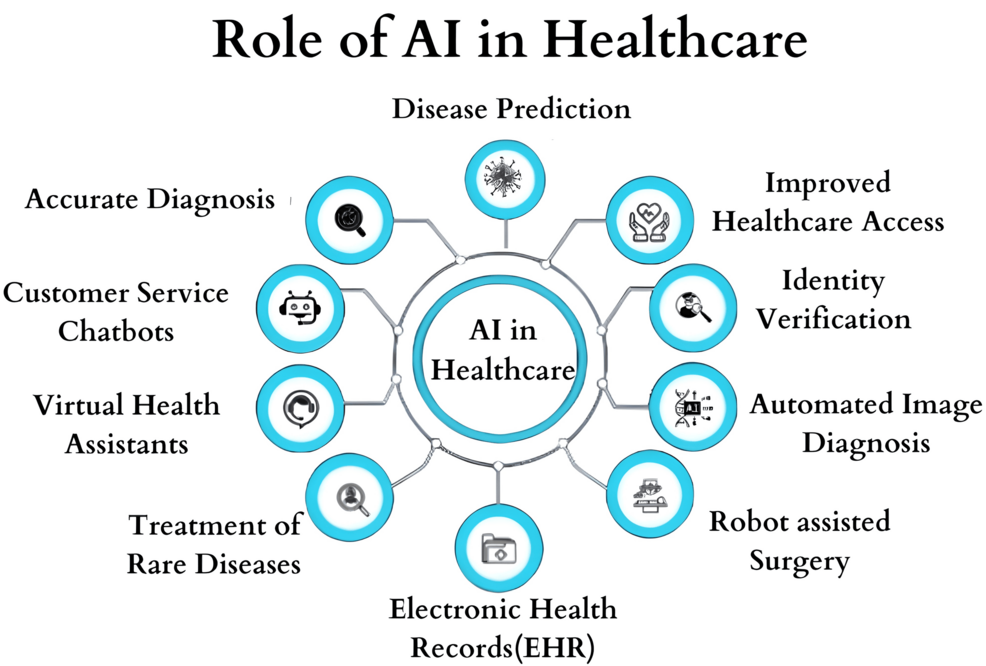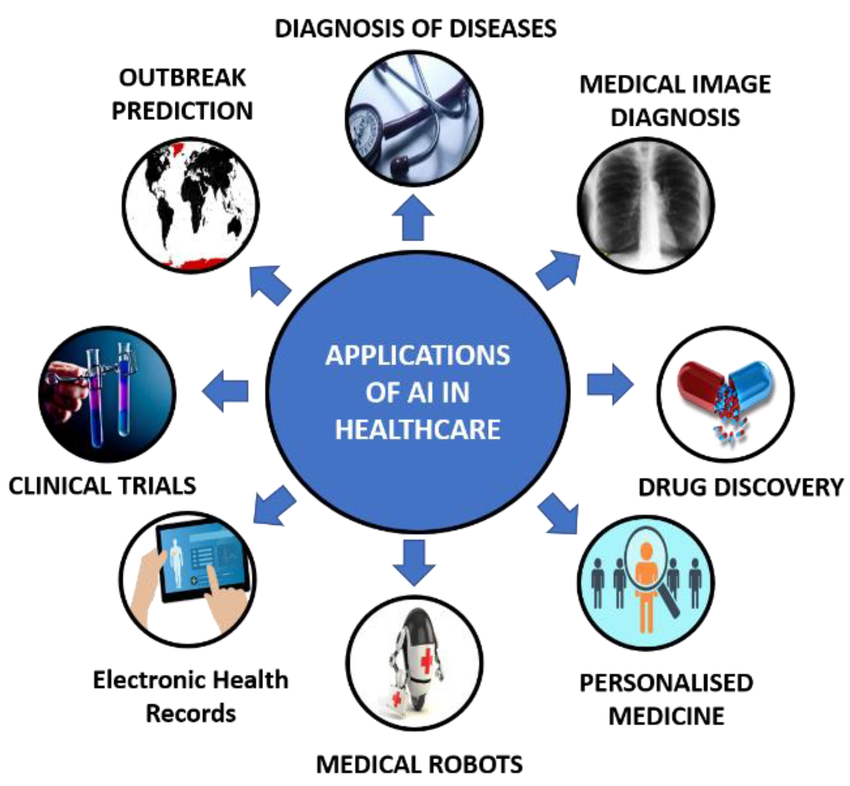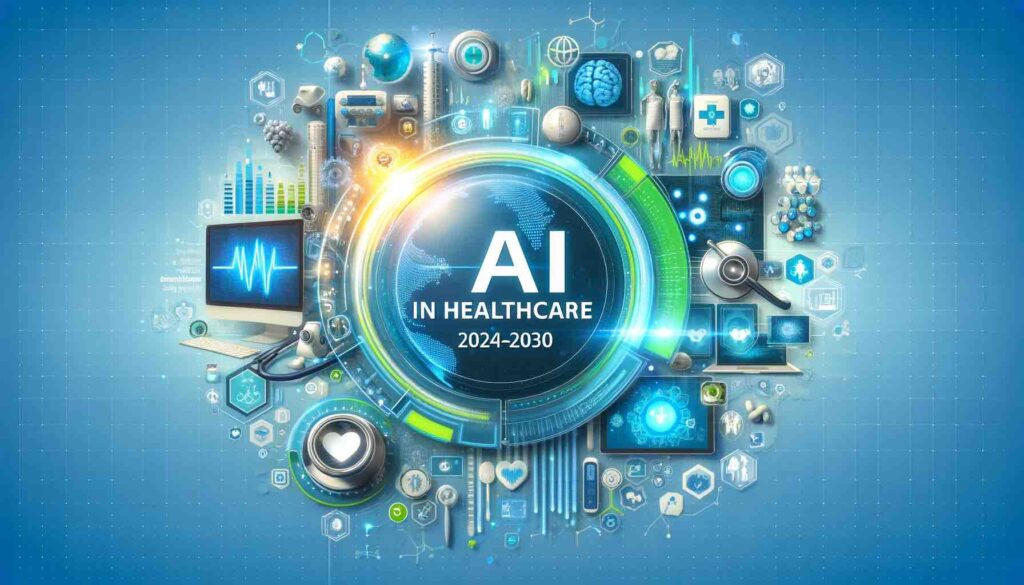
Explore the transformative impact of AI in healthcare. Discover how artificial intelligence enhances diagnostics, treatments, and patient care while also raising ethical concerns. Learn the pros, cons, and future implications of AI in medicine.
Introduction
Artificial Intelligence (AI) is revolutionizing healthcare. From early disease detection to robotic surgeries and personalized medicine, AI is pushing the boundaries of what’s possible in the medical field. But alongside these breakthroughs comes a growing debate: Is AI in healthcare a game-changing innovation or a looming ethical dilemma?

In this blog, we will explore the multifaceted role of AI in healthcare, examine its advantages, disadvantages, and ethical implications, and provide a forward-looking view into its impact on patients, practitioners, and the global health system.
What is AI in Healthcare?
AI in healthcare refers to the application of machine learning algorithms, natural language processing (NLP), computer vision, and robotics to perform tasks traditionally carried out by medical professionals. These include:
- Diagnosing diseases
- Recommending treatments
- Predicting patient outcomes
- Managing administrative workflows
- Assisting surgeries
AI tools can process vast amounts of data faster and often more accurately than humans, leading to earlier diagnoses and more precise treatments.
How AI Is Transforming Healthcare

1. Early Diagnosis and Imaging
AI can detect diseases such as cancer, Alzheimer’s, and retinal disorders by analyzing imaging data (MRI, CT scans, X-rays) with higher accuracy and speed.
- Example: Google’s DeepMind detects over 50 eye diseases as accurately as expert ophthalmologists.
- Benefit: Early diagnosis leads to better outcomes and survival rates.
2. Predictive Analytics
AI systems can predict disease risk, hospital readmissions, and even mental health relapses using electronic health records (EHRs) and real-time patient data.
- Example: IBM Watson predicts heart failure by analyzing medical records.
- Benefit: Preventive measures can be taken to reduce health crises.
3. Robotic Surgery
Robotic-assisted surgeries offer high precision, less trauma, and faster recovery. AI helps guide instruments based on patient-specific data.
- Example: da Vinci Surgical System
- Benefit: Reduced surgical complications, shorter hospital stays
4. Virtual Health Assistants
AI chatbots and voice assistants help with appointment scheduling, reminders, symptom checks, and medication management.
- Example: Babylon Health, Ada Health
- Benefit: Enhances access to healthcare and supports patients remotely
5. Drug Development

AI reduces the time and cost of drug discovery by simulating molecule behavior and predicting effectiveness.
- Example: Atomwise uses AI to identify promising compounds for diseases like Ebola and COVID-19.
- Benefit: Speeds up pharmaceutical innovation
6. Personalized Medicine
By analyzing genetic data, lifestyle, and history, AI helps customize treatment plans tailored to individual patients.
- Example: Oncology platforms offering targeted cancer therapies
- Benefit: Higher success rates and fewer side effects
7. Administrative Optimization
AI automates tasks such as billing, claims processing, and patient record management.
- Example: NLP tools extract data from medical notes.
- Benefit: Reduces clerical burden and improves accuracy
Advantages of AI in Healthcare
| Advantage | Impact |
|---|---|
| Faster Diagnosis | Reduces time to detect and treat diseases |
| Higher Accuracy | AI models often outperform human clinicians in image recognition |
| Cost Reduction | Cuts down human labor and administrative overhead |
| Expanded Access | AI tools reach rural and underserved populations |
| 24/7 Availability | AI systems don’t need breaks, providing constant care |
| Data-Driven Decisions | Enables evidence-based medical strategies |
| Streamlined Workflow | Automates routine admin tasks and reduces clinician burnout |
| Personalized Care | Tailors treatment based on individual health profiles |
Disadvantages and Ethical Concerns

Despite the promise, AI in healthcare raises serious questions: ai in healthcare industry
1. Data Privacy and Security
Medical AI requires large datasets, which means handling sensitive personal information. Breaches can have life-threatening consequences.
- Risk: Unauthorized access to patient records
2. Bias in AI Algorithms
AI reflects the biases in its training data. Underrepresented populations may receive inaccurate diagnoses or treatment suggestions.
- Example: Facial recognition tools underperform with darker skin tones.
3. Job Displacement
Some fear AI could replace healthcare professionals, especially in administrative or diagnostic roles.
- Reality: AI is more likely to assist than replace—but job dynamics will shift.
4. Lack of Human Empathy
AI lacks emotional intelligence and compassion, which are crucial in patient care, especially in palliative and mental health.
5. Accountability and Legal Issues
Who is responsible if an AI system makes a medical error? Doctors? Developers? Hospitals?
6. Over-Reliance on Technology
Relying too heavily on AI could reduce critical thinking among medical staff.
7. High Cost of Implementation
Initial investments in AI infrastructure and training can be substantial, particularly for smaller clinics or developing nations.
Real-World Applications: Case Studies ai in healthcare industry
Case 1: PathAI – Cancer Diagnostics
PathAI uses deep learning to assist pathologists in diagnosing cancer with higher accuracy.
Case 2: Aidoc – Radiology AI
Aidoc analyzes medical imaging to identify acute abnormalities in CT scans in real-time.
Case 3: BlueDot – Disease Surveillance
BlueDot flagged the COVID-19 outbreak days before WHO using AI-based monitoring of online news and flight data.
Global Adoption and Regional Trends
United States
- Strong in AI startups and funding
- Regulatory framework evolving (FDA AI/ML framework)
United Kingdom
- NHS exploring AI for predictive analytics
- Focus on data privacy under GDPR
UAE
- Embracing AI for telemedicine and smart hospitals
- Government AI strategy prioritizes healthcare
India
- AI used in rural diagnostics and teleconsultations
- High potential, but limited infrastructure
The Future of AI in Healthcare
AI’s role in medicine will grow exponentially: ai in healthcare industry
- Predictive genomics for hereditary conditions
- AI + IoT devices for real-time health monitoring
- Emotionally responsive AI for mental health
- Digital twins (virtual models of patients) for treatment simulations
However, progress must be ethical, inclusive, and regulated.
Key Takeaways
- AI is a powerful enabler of modern healthcare, offering precision, speed, and scalability.
- Ethical concerns, if unaddressed, could undermine trust and safety.
- The ideal future combines human intelligence with AI’s analytical power to enhance—not replace—healthcare.
FAQs
Q1: Can AI replace doctors?
No. AI is a tool to assist doctors in decision-making but lacks empathy, judgment, and clinical experience.
Q2: Is AI safe to use in healthcare?
With proper regulation and oversight, AI can be safe. However, vigilance is required to prevent misuse.
Q3: What is the biggest challenge in adopting AI in healthcare?
Balancing innovation with ethics, data privacy, and ensuring inclusiveness in AI training data.
Q4: How is AI used in drug discovery?
AI simulates molecular interactions and screens billions of compounds to accelerate drug development.
Q5: Is AI in healthcare cost-effective?
Long-term: Yes. Short-term: Implementation costs are high but payoff comes from efficiency gains and better outcomes.
Final Thoughts
AI is not a magic cure-all, but a game-changer with ethical implications. It holds the potential to transform healthcare from reactive to proactive, personalized, and data-driven. To harness its full potential, collaboration between technologists, healthcare providers, policymakers, and patients is essential.
Will AI heal healthcare or hurt it? The answer lies in how responsibly we build, regulate, and use it.






